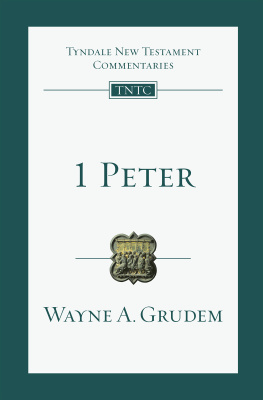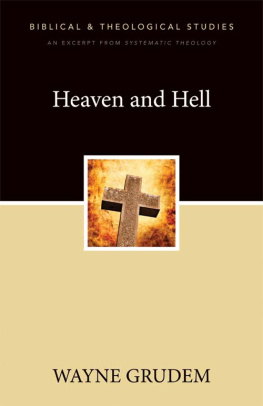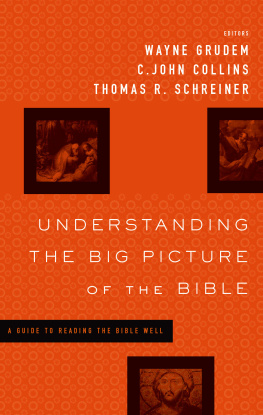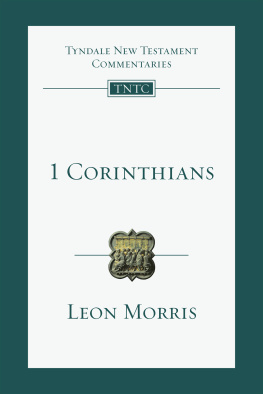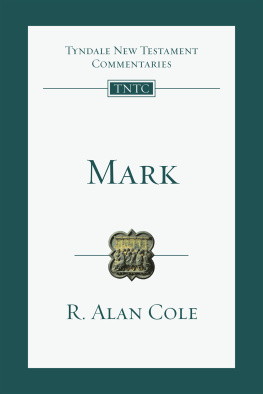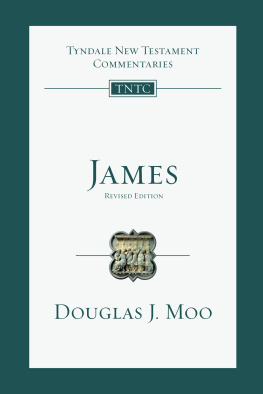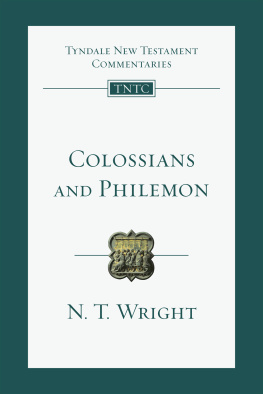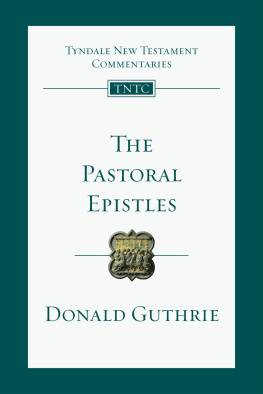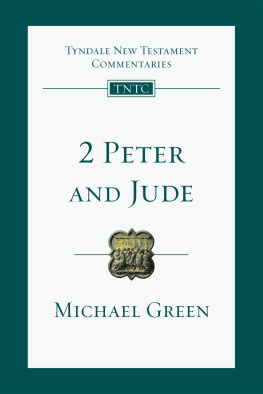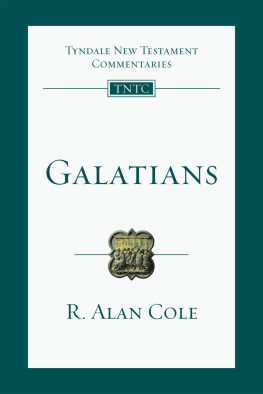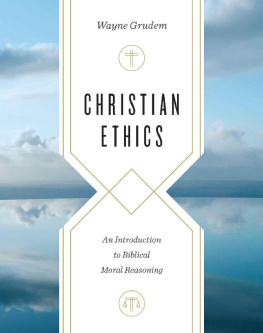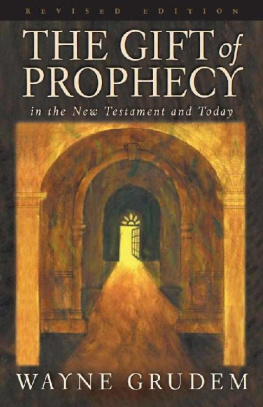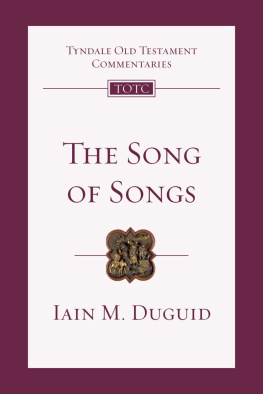TO MARGARET
A good wife who can nd?
She is far more precious than jewels.
The heart of her husband trusts in her
(Proverbs 31:1011)
TYNDALE NEW TESTAMENT
COMMENTARIES
VOLUME 17
GENERAL EDITOR: LEON MORRIS
1 PETER
AN INTRODUCTION AND COMMENTARY
WAYNE A. GRUDEM
Inter-Varsity Press, USA
P.O. Box 1400, Downers Grove, IL 60515-1426, USA
World Wide Web: www.ivpress.com
Email:
Wayne A. Grudem 1988
All rights reserved. No part of this publication may be reproduced, stored in a retrieval system or transmitted in any form or by any means, electronic, mechanical, photocopying, recording or otherwise, without the prior permission of Inter-Varsity Press.
InterVarsity Press, USA, is the book-publishing division of InterVarsity Christian Fellowship/USA and a member movement of the International Fellowship of Evangelical Students.
Unless otherwise stated, quotations from the Bible are from the Revised Standard Version, copyrighted 1946, 1952
1971, 1973 by the Division of Christian Education, National Council of Churches of Christ in the USA, and used by permission.
First published 1988
ISBN 978-0-8308-9936-4 (digital)
ISBN 978-0-8308-4247-6 (print)
Any internal page references refer to page numbers in the print edition.
This digital document has been produced by Nord Compo.
TYNDALE NEW TESTAMENT
COMMENTARIES
VOLUME 17
1 PETER
General preface
The original Tyndale Commentaries aimed at providing help for the general reader of the Bible. They concentrated on the meaning of the text without going into scholarly technicalities. They sought to avoid the extremes of being unduly technical or unhelpfully brief. Most who have used the books agree that there has been a fair measure of success in reaching that aim.
Times, however, change. A series that has served so well for so long is perhaps not quite as relevant as when it was rst launched. New knowledge has come to light. The discussion of critical questions has moved on. Bible-reading habits have changed. When the original series was commenced it could be presumed that most readers used the Authorized Version and one could make ones comments accordingly, but this situation no longer obtains.
The decision to revise and update the whole series was not reached lightly, but in the end it was thought that this is what is required in the present situation. There are new needs, and they will be better served by new books or by a thorough updating of the old books. The aims of the original series remain. The new commentaries are neither minuscule nor unduly long. They are exegetical rather than homiletic. They do not discuss all the critical questions, but none is written without an awareness of the problems that engage the attention of New Testament scholars. Where it is felt that formal consideration should be given to such questions, they are discussed in the Introduction and sometimes in Additional notes.
But the main thrust of these commentaries is not critical. These books are written to help the non-technical reader to understand the Bible better. They do not presume a knowledge of Greek, and all Greek words discussed are transliterated; but the authors have the Greek text before them and their comments are made on the basis of the originals. The authors are free to choose their own modern translation, but are asked to bear in mind the variety of translations in current use.
The new series of Tyndale Commentaries goes forth, as the former series did, in the hope that God will graciously use these books to help the general reader to understand as fully and clearly as possible the meaning of the New Testament.
Leon Morris
Authors preface
Over the last four years I have worked closely with the text of 1 Peter, both in teaching it and in writing this commentary. As I now complete the commentary I am surprised that, far from being tired of the words of this letter, I hear them speak with more directness and urgency to my own life, and I still nd joy and spiritual refreshment reading them again and again. For me personally, this is yet further conrmation of the character of this letter as the living and abiding word of God (1 Pet. 1:23).
I do not think that any Christian can study this letter for long without hearing in it the voice of God speaking powerfully to the needs of todays church. In only 105 verses, 1 Peter ranges over a wide eld of Christian theology and ethics. Here is the great doctrine of redemption, from its conception before the foundation of the world to its consummation in our receiving an inheritance that will never fade away. Here are repeated calls to holiness and to humble trust in God for each days needs. Here is practical counsel for marriage, for work, for relating to the government, for witnessing to unbelievers, for using spiritual gifts, for serving as a church ofcer.
Here also is profound comfort in sorrow, and insight, as far as God allows, into the deep mysteries of suffering and reprobation. Here is the majestic beauty of the church as a spiritual temple in which we daily offer spiritual sacrices pleasing to God. And here is Jesus the chief Shepherd who cares for us, the example who leads us, the chosen cornerstone who establishes and unites us, and the Saviour who bore our sins in his body on the cross the one whom, not having seen, we love. The glory of Christ shines forth from this letter into the hearts of all who read it. For churches and for individuals seeking to grow in holiness, in faith, and in love for Christ, Gods words in 1 Peter will richly repay serious study, memorization, and meditation.
Studies in 1 Peter during this century have tended to emphasize attempts to discover sources behind 1 Peter (was it originally a baptismal sermon? a baptismal liturgy? does it depend on Paul? on James? on early catechisms? on moral codes common in a pagan society?). Other studies have focused on the setting in which it was written (ofcial persecution? baptismal service? Easter liturgy?). But exegesis of the text itself (other than to answer those questions) has been somewhat neglected.
I have found myself largely unpersuaded by these studies regarding sources and setting, primarily because in my own judgment at least they almost uniformly attempt to draw conclusions based on far too little data. Perhaps it is time to admit that the requisite evidence for answering such questions is simply not available to us, and that good stewardship of the time and skills which God has given us would seem to require that we give more attention to the text itself, not primarily to determine its original setting and sources, but to ascertain its meaning for Peter and his original readers, and then its proper application to our own lives.
This commentary probably has a higher than average frequency of citations from other ancient texts, both biblical and extrabiblical, and a lower than average frequency of citations from other commentaries. This is intentional, because I think it very important for Christians to come to accept a particular interpretation of any verse not because some expert has given his opinion in favour of it, but because they have seen for themselves the evidence which supports that interpretation, and the evidence has convinced them.

